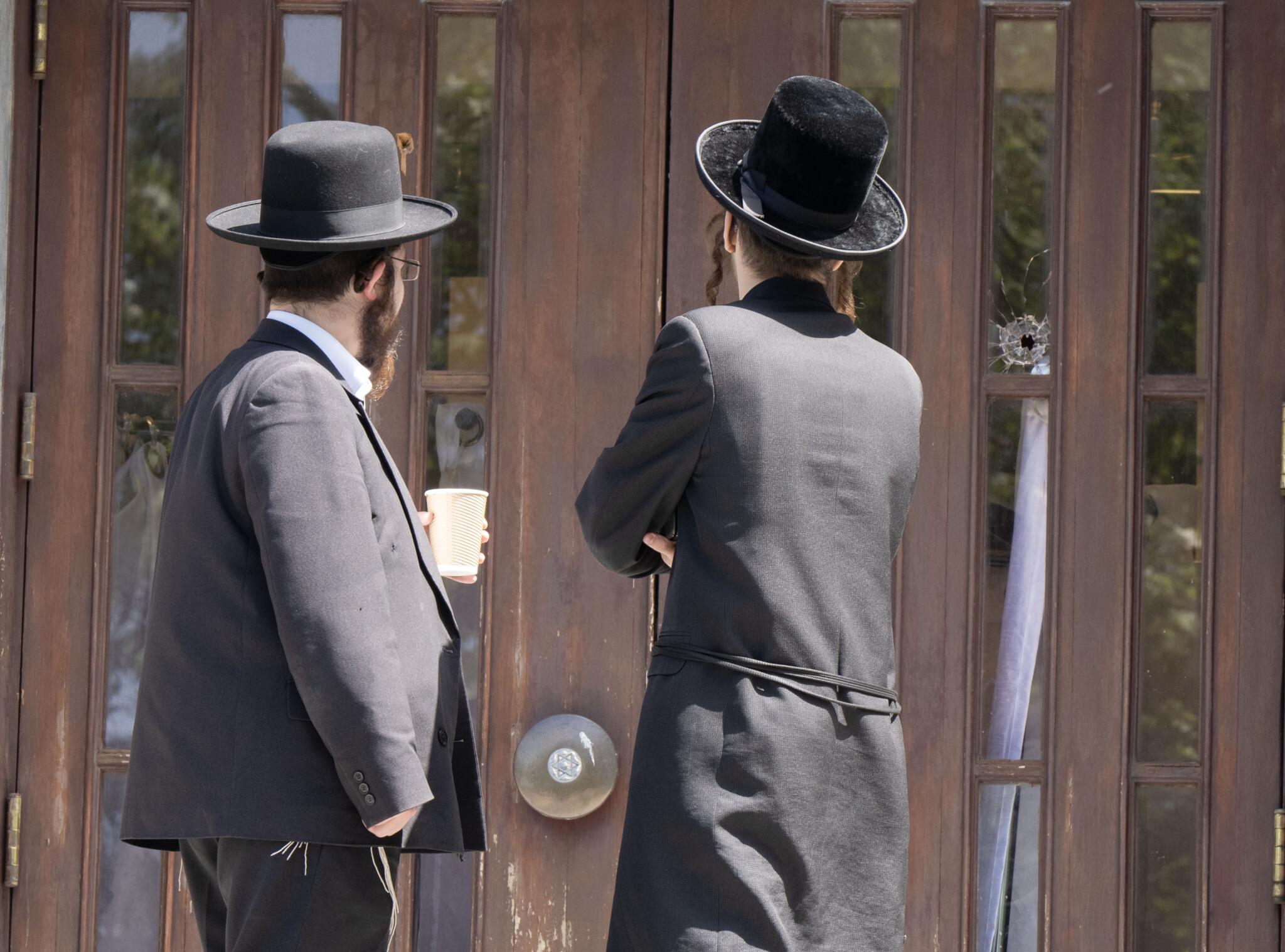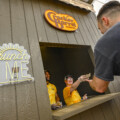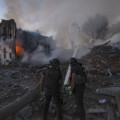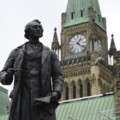When Canadians talk about Canada, their discussions frequently turn to the ways that it is (quietly) superior to the United States. Of the many advantages, here is one that is rarely mentioned: that we can sometimes observe the conditions of liberal democracy more clearly in Canada at a remove from the glare shed by its neighbour’s superpower status.
For example, since the 10/7 attacks on Israel and the subsequent Israeli invasion of Gaza, the United States has seen waves of protests—as well as a notable rise in antisemitism—across the country. These are frequently attributed to the inevitable dissatisfaction that arises from America’s role as Israel’s patron.
Yet, it is less remarked upon how Canada—which plays at best a minimal role in the geopolitics of the Middle East—has seen similar protests and a similar rise in antisemitic activity over that same period. For the former, the major thoroughfares of Toronto, Montreal, and Vancouver are now routinely besieged by demonstrators, some of them bearing not just the Palestinian flag but the standards of designated terrorist organizations like Hamas and Hezbollah. For the latter, synagogues and Jewish schools and other establishments across the country have already been subject to vandalism, harassment, arson.
All of these and more have transpired over the past year and a half, though the response has been relatively muted. Now, just recently, the Holocaust Memorial in Ottawa has been defaced, as though the slaughtered Jews must now answer for the suffering in Gaza. At this point, some sort of reality began to set in, and politicians lined up to issue boilerplate condemnations. Though at least some also noted that this sort of vandalism doesn’t help the Palestinian cause—a point that while probably true is also a good example of what the philosopher Bernard Williams referred to as “one thought too many.”
Interestingly, that same memorial had previously been the site of some controversy, when its original plaque (since replaced) failed to actually mention, uh, Jews. In retrospect, this was quite telling, though its import was not immediately obvious. It was telling, because in defaulting to generic claims about hatred and prejudice, it displayed a certain discomfort with what we might as well call the Jewish question.
To explain: though antisemitism is frequently referred to as the “oldest hatred,” these latest developments are, if not wholly new, at least a new variation, for which prior instances offer minimal guidance. The classic problem is that of the persecuted and supposedly unassimilable minority, exemplified in Canada by the notorious “None is too many” policy or Duplessis’ campaign for the premiership of Quebec during the Second World War. But Jews are no longer a unique minority in a country that has prioritized global immigration and multiculturalism for many decades, and in which “visible minorities” are expected to approach half the population by the middle of this century.
At the same time, Jews remain very much a minority unto themselves, with just under 400,000 total across the country. What makes the present dilemma distinctive is that it stems not from a hostile majority population but from other minority populations that view Canadian Jews as convenient extensions of Israel (and thus as legitimate targets), along with assorted radicals operating under the same logic.
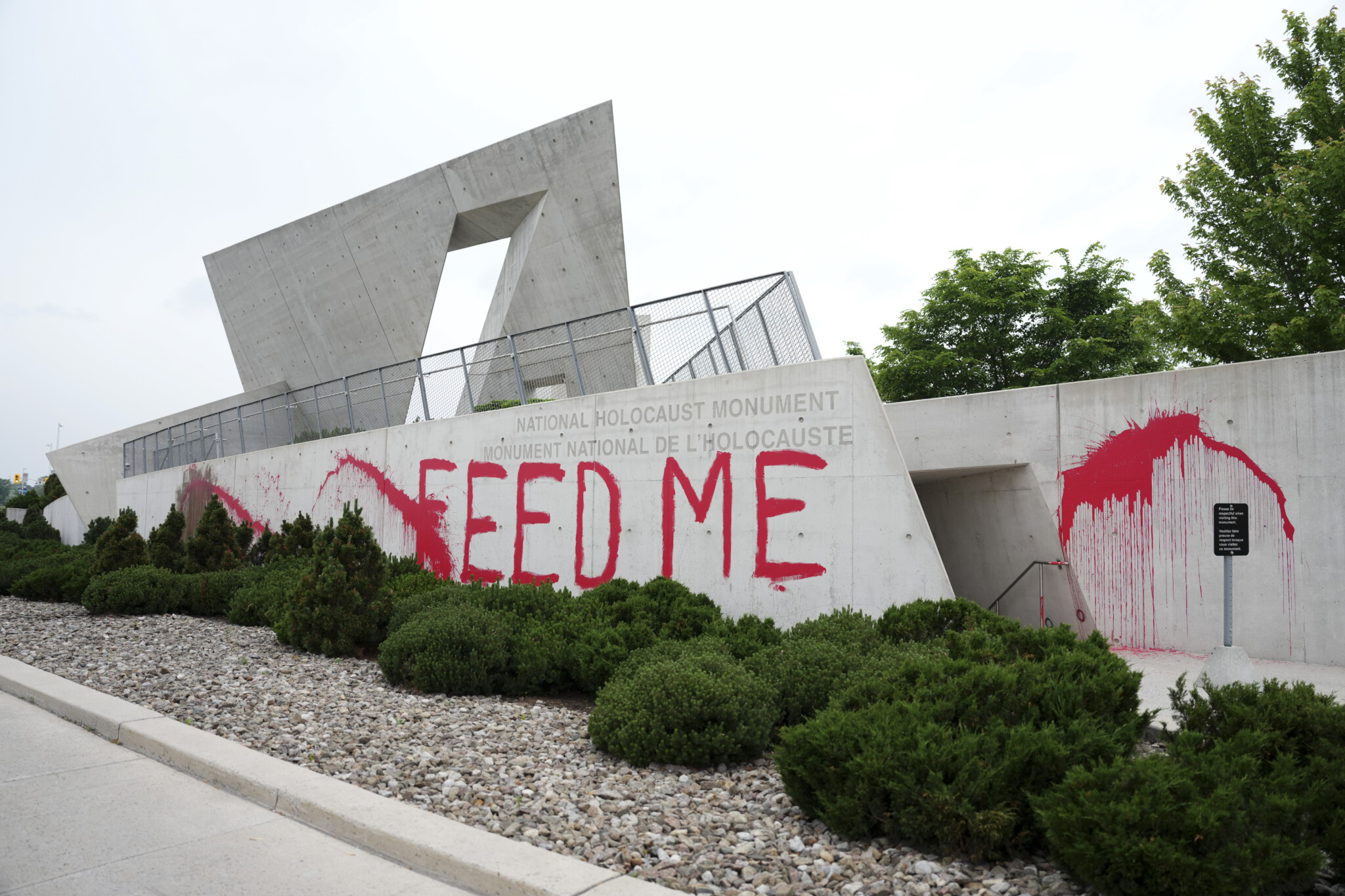
The National Holocaust Monument defaced in Ottawa, June 9, 2025. Sean Kilpatrick/The Canadian Press.
It is thus the perfect moral shell game: you can harass and even harm Jews under the belief that you are functionally fighting Nazis. All of the fun of antisemitism (venting one’s anger and resentment upon a minority group) with none of the burdens of conscience that might otherwise come with it (because you are in fact venting your anger and resentment upon a minority group). More broadly, the prevailing liberal institutions have removed many of the safeguards that might have once checked these tendencies.
Consequently, this sort of vandalism—much like the idiot yelling antisemitic slurs at (the admittedly irritating) Dave Portnoy the other week—is both unprecedented and precedented. It is in a broad sense unprecedented in a country like Canada known for its mild political culture with a tradition of hospitableness for its Jewish communities. But it is in a narrower sense preceded by 18 months and more of fraying civic threads and the suspension of ordinary laws and norms for the champions of politically favoured causes.
For example, prior to the vandalism of the Holocaust Memorial, Mohamed Fakih, a highly successful entrepreneur and recipient of the Order of Canada, posted on X that, given their affiliations with the state of Israel, synagogues were perfectly legitimate targets of protest—a sentiment echoed by left-leaning academics. That is to say, unless they satisfy certain political and ideological conditions, Jews can continue to expect to be targeted in their neighbourhoods and places of worship. This was remarkable in its own right, but also for what it signified: a willingness to dispense with the modern liberal agreement concerning tolerance and coexistence, exchanging it for a new model of increasingly comprehensive politicization.
Now, it should be noted that Canada has already seen a disturbing spate of church-burnings over the past several years, seemingly triggered by the false reports of mass murder at residential schools. This itself was a highly worrisome development, though the public response to this on the part of both media and elected officials was to downplay it rather than excuse it, though that was really bad enough. What we are seeing now, however, is something new: the attempt to legitimize behaviour that was once completely outside the boundaries of political order in liberal societies. This is a matter of concern not just for Canada’s Jews, then, but for everybody.
None of this is to suggest that Jews should be entitled to special protections; but contemporary liberalism has largely abandoned traditional notions of political legitimacy in favour of offering precisely such protections to preferred groups under its coalition. It is particularly in light of its own record, then, that the present situation of Jews stands out.
The reality is that the world is not always such a nice place, and nasty things are bound to happen from time to time, even in “nice” countries. Any one of these incidents could have been chalked up to that same inevitability, but taken together, it is increasingly difficult to avoid the conclusion: these things didn’t use to happen here; now they do. The inability to properly respond to—or even recognize—this development is yet another test that Canada’s governments at all levels are presently failing.
